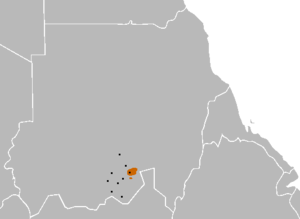Tegali language
Tegali (also spelled Tagale, Tegele, Tekele, Togole) is a Kordofanian language in the Rashad family, which belongs to the larger Niger–Congo phylum (Greenberg 1963, Schadeberg 1981, Williamson & Blench 2000).[2] It is spoken in South Kordofan state, Sudan.
| Tegali | |
|---|---|
| Tagale, Tegele, Tekele, Togole | |
 | |
| Native to | Sudan |
| Region | South Kordofan |
| Ethnicity | Tagale |
Native speakers | (35,700 cited 1984) |
Niger–Congo
| |
| Dialects |
|
| Language codes | |
| ISO 639-3 | ras |
| Glottolog | tega1236 Tegali[1] |
Classification
The Rashad family of language consists of two dialect clusters, "Tegali" and "Tagoi". They are spoken on two mountain ranges to the north and north-west of Rashad.[3] These languages are spoken in the Tegali Hills in the north-east of the Nuba Mountains, the home of the former "Tegali Kingdom".[4]
Dialects/varieties
Tegali has three varieties, Rashad (Gom, Kom, Kome, Ngakom), Tegali, and Tingal (Kajaja, Kajakja). Ethnologue states that Rashed and Tegali dialects are nearly identical.[5] Tucker and Bryan list Rashad as almost identical to Tegali, "perhaps a mere variation of one language";[6] however, Greenberg lists it as a separate language.[7] Welmers suggests Tingal as a dialect of Tegali;[8] Tucker and Bryan report this as different from Tegali and Rashad, but as definitely belonging to the Tegali branch.[6]
Geographic distribution
There are 35,700 native speakers of Tegali in South Kordofan state, Sudan.[5] Speakers are distributed in the hills between the Rashud-Rashad and Rashad-Umm Ruwaba roads, with a few outlying hills west of Rashad (including Tagoi and Tarjok) and scattered hills south of Rashad.[9]
Grammar/vocabulary
Tegali is closely related to Tagoi. The most conspicuous difference between the two dialect clusters is that Tagoi has a complex system of noun classes while Tegali does not. Tegali and Tagoi share about 70% basic vocabulary (100-word list). Different explanations exist for why Tegali dialects lack of noun class system. Greenberg (1963), who excludes the possibility of mass borrowing of basic vocabulary in Tegoi, regards the two dialect clusters as closely related and assumes the loss of noun classes in the Tegali dialects.[10]
Examples
Numeral system
Tegali has a counting system similar to that of Tagoi. But now they seemed have developed a more complete numeral system. There is an option for the number 20 'fəŋəndən rəkkʊ'.[11]
References
- Hammarström, Harald; Forkel, Robert; Haspelmath, Martin, eds. (2017). "Tegali". Glottolog 3.0. Jena, Germany: Max Planck Institute for the Science of Human History.
- "Occasional Papers in the Study of Sudanese Languages No. 11". SIL International. Retrieved 2017-04-30.
- Schadeberg, Thilo C.; Elias, Philip (1979). A description of the Orig language: (Southern Kordofan), based on the notes of Fr. Carlo Muratori. Tervuren: Musée royal de l'Afrique centrale. Musee Royal De L'afrique Centrale. p. 3.
- Stevenson, R. C. (January 1964). "LINGUISTIC RESEARCH IN THE NUBA MOUNTAINS—II". Sudan Notes and Records. 45: 79–102. JSTOR 41716860.
- "Tegali". Ethnologue. Retrieved 2017-04-28.
- Tucker, A. N.; Bryan, M. A. (1956). The Non-Bantu Languages of North-Eastern Africa. London: Oxford University Press Published for the International African Institute. p. 270.
- Greenberg, Joseph H. (1950-01-01). "Studies in African Linguistic Classification: VII. Smaller Families; Index of Languages". Southwestern Journal of Anthropology. 6 (4): 388–398. JSTOR 3628564.
- Welmers, William Everett (1973). African Language Structures. Berkeley: University of California Press.
- Voegelin, C.F.; Voegelin, F.M. (May 1964). "Languages of the World: Indo-Pacific Fascicle One". Anthropological Linguistics. 6: 195–196. JSTOR 30022465.
- Schadeberg, Thilo C. (1981). A survey of Kordofanian. Hamburg: Helmut Buske. pp. 67–80.
- Norton, Russell (January 25, 2008). "Tegali, Sudan". Numeral Systems of the World's Languages.
External links
- Tegali at the Endangered Languages Project
- Simons, Gary F. and Charles D. Fennig (eds.). 2017. Ethnologue: Languages of the World, Twentieth edition. Dallas, Texas: SIL International.
- Hammarström, Harald & Forkel, Robert & Haspelmath, Martin. 2017. Glottolog 3.0. Jena: Max Planck Institute for the Science of Human History.
- Tegali at the Numeral Systems of the World's Languages